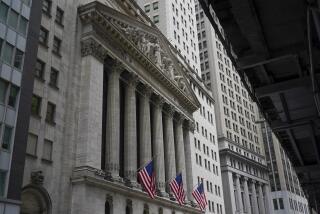Brokers Enjoying Brief Windfall, but Outlook for Industry Still Grim
- Share via
The last several years have been tough on your stockbroker.
Ever since the market meltdown in October, 1987, when the Dow Jones industrial index plunged a record 508 points, brokers have been able to entice fewer of their customers into buying and selling stocks.
Stockbrokers, who earn their money primarily through commissions, were hard hit. Not only did their incomes decline dramatically--the average broker earns $18,000 less per year now than in 1986--many were laid off as firms found they could no longer afford large retail sales forces.
More than 40,000 Wall Street workers have lost their jobs since 1987, and many of the largest brokerage houses lost so much money that they have been forced to close their doors.
But in the past week, stock trading has been brisk. Indeed, volume on the New York Stock Exchange has soared to levels unseen since the boom times of 1986 and 1987.
Does this mean another golden age for Wall Street firms and those who work for them? Hardly.
Wall Street experts say if the trading activity of the past week keeps up, it could prove the most crippling problem yet for brokerage houses and brokers, despite the fact that commission revenue may rise in the short run.
“This is not a market that is going up and going down. This is a market that is going down,” said Lloyd Greif, vice chairman of the investment firm Sutro & Co. in Los Angeles. “People are selling out, getting their assets out of stocks and into other investments. We may have a feast right now” with high commission revenue, he added. “But the famine is right around the corner.”
Stock prices have declined steadily for the past two weeks, pulling the Dow index down more than 200 points. At the same time, trading has been unusually brisk. Trading volume has averaged more than 200 million shares daily since the beginning of August--a feat not matched since before the 1987 market crash, according to the Securities Industry Assn.
The combination of brisk trading and declining stock prices underscores Greif’s contention--that people are bailing out of the stock market. And if they don’t return to the market quickly, securities firms are bound to suffer, according to market experts.
“We might see some high-commission days, but the problem is that in a down market, you know the commissions are eventually going to dry up,” said Lawrence Eckenfelder, an analyst with Prudential-Bache Securities in San Francisco. “Once people are done selling, you could have some really low volume.”
Moreover, the market selloff is likely to hit brokerage houses in other ways as additional sources of revenue begin to dry up.
“The one area (of the brokerage industry) that has been reasonably healthy this year was the initial public offering market,” Eckenfelder said. “But most of those deals are done over the counter, and the over-the-counter market has been falling apart here.”
Eckenfelder predicts that a number of companies that had planned to go public will suspend their offerings during the next several months. Meanwhile, publicly traded firms that had hoped to return to the stock market to raise more cash will also be stymied, he said.
That will cut into the profits of securities firms by eliminating or paring the fees that they would have earned had the deals been completed, he said.
Additionally, few experts believe that the currently moribund mergers and acquisition business, which typically picks up in times of falling stock prices, will be able to make up for declining revenue elsewhere.
“I wouldn’t count on the mergers and acquisitions market reviving,” said Doyle Lyons, securities analyst with Merrill Lynch in New York.
The problem, Lyons said, is that banks have become much more conservative about lending for takeovers. And with many economists predicting a further economic slowdown--or even a recession--credit is not likely to become more readily available any time soon.
To add insult to injury, most brokerage firms--and many stockbrokers--have their own trading accounts. And as the Dow has slipped from a high of nearly 3,000 to Tuesday’s close of 2,710.64, the value of these portfolios has also diminished.
“Markets like this are never a good thing for anybody,” said Harold J. Meyers, chairman and chief executive of the investment firm H. J. Meyers & Co. in Los Angeles.
Added Michael Tennenbaum, vice chairman of Bear, Stearns & Co.: “These are very tough times for Wall Street.”
More to Read
Inside the business of entertainment
The Wide Shot brings you news, analysis and insights on everything from streaming wars to production — and what it all means for the future.
You may occasionally receive promotional content from the Los Angeles Times.










